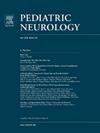脑积水avatar教育项目对脑室-腹膜分流并发症及家长知识和护理技能的影响:多中心随机对照试验
IF 2.1
3区 医学
Q2 CLINICAL NEUROLOGY
引用次数: 0
摘要
预防脑积水并发症和教育家长长期护理是至关重要的。考虑到脑积水的全球负担,它是一个令人惊讶的被忽视的问题。本研究旨在开发一种基于虚拟形象的脑积水教育计划,并确定其对家长知识、护理技能和分流并发症的影响。方法采用单盲、多中心、随机对照试验。参与者被随机分配到虚拟化身辅助教育项目或标准护理对照组。分别在1个月、3个月和6个月对父母的脑积水知识、护理技能自我评估和分流并发症随访清单进行评估。结果干预组家长对脑积水知识和护理技能的自评得分与对照组有显著差异。在第三次和最后一次试验中,并发症参数有显著差异。各组间沉降和c反应蛋白水平差异有统计学意义,但白细胞计数差异无统计学意义。虽然两组之间的体温和头围有显著差异,但格拉斯哥昏迷量表组之间没有显著差异。结论为脑积水患儿家长开发的虚拟教育项目干预,能有效提高家长的知识和护理技能,减少分流并发症的发生。本文章由计算机程序翻译,如有差异,请以英文原文为准。
Effect of Avatar-Based Education Program in Hydrocephalus on Ventriculoperitoneal Shunt Complications and Parents' Knowledge and Care Skills: Multicenter Randomized Controlled Trials
Background
Preventing complications of hydrocephalus and educating parents about long-term care is critical. Hydrocephalus is a surprisingly neglected issue, considering its global burden. This study aims to develop an avatar-based education program for hydrocephalus and determine its effect on parents' knowledge, care skills, and shunt complications.
Methods
This study is a single-blind, multicenter, randomized controlled trial. Participants were randomly assigned to an avatar-assisted education program or a standard care control group. Parents' hydrocephalus knowledge, self-assessment of care skills, and shunt complication follow-up list were assessed at one, three, and six months.
Results
The study findings showed that the self-assessment scores of the parents in the intervention group regarding their knowledge and care skills about hydrocephalus differed significantly from those of the control group. A significant difference was obtained in the complication parameters in the third and last tests. While there was a significant difference between the sedimentation and C-reactive protein level between the groups, no significant difference was found between the white blood cell count. While there was a significant difference in the body temperature and head circumference between the groups, no significant difference was found between the Glasgow coma scale groups.
Conclusions
The avatar-based education program intervention developed for parents of children with hydrocephalus was effective in increasing parents' knowledge and care skills and reducing shunt complications.
求助全文
通过发布文献求助,成功后即可免费获取论文全文。
去求助
来源期刊

Pediatric neurology
医学-临床神经学
CiteScore
4.80
自引率
2.60%
发文量
176
审稿时长
78 days
期刊介绍:
Pediatric Neurology publishes timely peer-reviewed clinical and research articles covering all aspects of the developing nervous system.
Pediatric Neurology features up-to-the-minute publication of the latest advances in the diagnosis, management, and treatment of pediatric neurologic disorders. The journal''s editor, E. Steve Roach, in conjunction with the team of Associate Editors, heads an internationally recognized editorial board, ensuring the most authoritative and extensive coverage of the field. Among the topics covered are: epilepsy, mitochondrial diseases, congenital malformations, chromosomopathies, peripheral neuropathies, perinatal and childhood stroke, cerebral palsy, as well as other diseases affecting the developing nervous system.
 求助内容:
求助内容: 应助结果提醒方式:
应助结果提醒方式:


